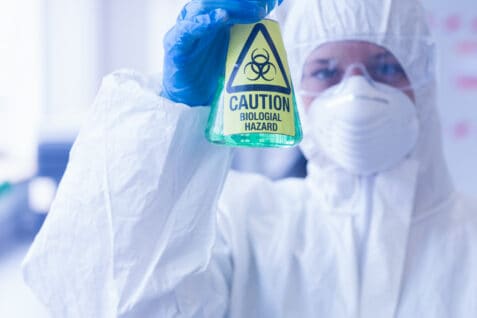How Can Companies Prevent Chemical Spills?

Did you know that there is about one chemical spill that happens every day and a half? The Coalition to Prevent Chemical Spills reports that this year there have been more spills than ever. It’s more important than ever for business leaders to make safe policies.
Chemical spills are a serious threat to human health, the environment, and wildlife. Companies that use chemicals in their operations must take all necessary precautions to prevent spills. They need to ensure the safety of their employees, customers, and the community.
In this article, we will explore some ways in which companies can prevent chemical spills and protect their stakeholders. Keep reading for what you should know.
Types of Chemical Spills
There are several types of chemical spills that companies should be aware of. Understanding the types of spills can help companies prepare and respond to them. Here are the most common types of chemical spills:
Small Spills
Small spills are the most common type of chemical spill. They involve a small quantity of non-hazardous chemicals. They can be easily cleaned up by employees using absorbent materials such as sand or cat litter.
Large Spills
Large spills involve a significant amount of hazardous chemicals and can pose a serious threat to employees and the environment. They require immediate action, and this should be from trained employees.
Releases
Releases occur when a chemical is accidentally released into the environment, such as in the air or water. These types of spills can be especially dangerous if they involve hazardous chemicals. They can harm wildlife and contaminate drinking water.
Explosions
Explosions are rare but can occur if a chemical is not handled or stored properly. Explosions can cause serious injury or death, as well as extensive damage to buildings and equipment.
Fires
Fires can occur when a chemical comes into contact with an ignition source, such as a spark or open flame. Fires can be especially dangerous if they involve flammable or combustible chemicals.
Companies must be aware of the different types of chemical spills to properly prepare for and respond to them. Small spills can be easily cleaned up by employees. Large spills, releases, explosions, and fires need specialized training.
These often need equipment to safely manage. Understanding the types of spills that can occur is an important part of chemical management. It can help prevent dangerous chemical spills from happening in the first place.
Know Your Chemicals
The first step in preventing chemical spills is to understand the types of chemicals used in the workplace and their potential risks. Companies should have a chemical inventory.
It should list all the chemicals they use, their properties, and their risks. This inventory should update regularly and be accessible to all employees.
Proper Chemical Management
Chemical management is critical for preventing spills. This involves proper storage, handling, and disposal of chemicals. Companies should have clear guidelines for storing chemicals, including temperature and humidity requirements.
The storage areas should be well-ventilated. They should also have safety features such as spill containment systems.
Employees who handle chemicals should receive proper training. They need to follow safety protocols to cut the risk of spills. All employees should get training on how to handle hazardous materials. They should be aware of the dangers of different types of chemicals.
Avoid Dangerous Chemicals
Some chemicals are so dangerous that they should not be used at all. Companies should assess the risks associated with using certain chemicals. Also, consider less hazardous alternatives.
If there is a dangerous chemical, the company should have a plan in place to handle spills. This includes providing appropriate protective equipment and training employees on spill response.
The Cost of Chemical Spills
Chemical spills can be costly for companies, both in terms of financial expenses and damage to their reputation. Here are some of the costs associated with chemical spills:
Clean-up Costs
The cost of cleaning up a chemical spill can be significant, especially if it involves a large amount of hazardous material. Companies may need to hire specialized clean-up crews and equipment to properly manage the spill.
Fines and Penalties
Companies that violate environmental regulations or fail to manage chemicals may face fines. They can get penalties from government agencies. These fines can be large and can also damage the company’s reputation.
Business Interruption
Chemical spills can also cause business interruption. These companies may need to shut down operations while the spill is being cleaned up. This can result in lost productivity, missed deadlines, and a loss of revenue.
Reputation Damage
Chemical spills can damage a company’s reputation, especially if they are widely publicized in the media. This can lead to a loss of customers and a decline in sales.
Environmental Damage
Chemical spills can have long-lasting effects on the environment. They can cause damage to wildlife and ecosystems.
Companies may be responsible for the cost of environmental remediation. The climate crisis is serious enough without more chemical spills in the mix.
SDS Management Services
SDS management services can help prevent chemical spills. SDS stands for Safety Data Sheet, which is a document that provides information about the hazards of a chemical and how to handle it safely. SDS management services help companies keep track of their SDSs.
They ensure that they are up-to-date and easily accessible to employees. This can help prevent spills by ensuring that employees have the information they need to handle chemicals safely. Here are some of the benefits of using SDS management services:
Easy Access to SDSs
SDS management services provide a centralized location for all SDSs. This helps in making it easy for employees to access them whenever needed. This helps ensure that employees have the information they need to handle chemicals safely.
Compliance with Regulations
SDS management services help companies comply with regulations related to chemical safety. Many countries have regulations. These make companies keep SDSs up-to-date and accessible to employees.
By using these services, companies can ensure that they are meeting these requirements.
Time-Saving
Managing SDSs can be time-consuming, especially for companies that use a large number of chemicals. SDS management services can save time by automating many of the tasks involved in managing SDSs. This can free up time for employees to focus on other tasks.
Reduced Risk of Spills
Having up-to-date SDSs can help reduce the risk of spills. SDSs provide important information about how to handle chemicals safely, including how to prevent spills and what to do in case of a spill. By making this information easily accessible to employees, SDS management services can help prevent spills and reduce the risk of accidents.
Improved Communication
SDS management services can help improve communication between different departments within a company. For example, if an SDS is updated, the system can automatically notify all relevant employees. This can help ensure that everyone has access to the most up-to-date information.
SDS management services provide many benefits for companies that use chemicals. These services can help ensure compliance with regulations and save time.
They also reduce the risk of spills and improve communication within the company. By using SDS management services, companies can take a proactive approach to chemical safety.
SDS Management Software
SDS management software is available in various forms, including mobile apps and online platforms. These tools can help companies easily access and manage their SDSs. This will lead to ensuring that they are up-to-date and readily available to employees.
Mobile SDS
A mobile app allows employees to access SDSs on the go, from their smartphones or tablets. This can be particularly useful for employees who work in the field or at remote locations. These are places where access to a computer may have limits.
Mobile apps can also provide real-time updates. These alerts regard changes ensuring that employees always have the most current information
Online SDS
Online SDS management platforms provide companies with a location to store their SDSs. This makes it easy to access from any location with an internet connection. It allows for easy sharing and collaboration among employees.
Online SDS management platforms also include features. These include automatic SDS updates, inventory tracking, and reporting tools.
Both platforms can help companies streamline their SDS management processes. It also helps reduce the risk of errors, and noncompliance and improves safety.
Regular Inspections and Maintenance
Regular inspections and maintenance of equipment can help prevent chemical spills. Companies should have a maintenance program in place that includes regular inspections of equipment and infrastructure that are used to store or transport chemicals.
Any issues or defects should be addressed promptly to prevent accidents or spills.
Emergency Response Plan
Having an emergency response plan is essential for minimizing the damage caused by a chemical spill. Companies should have a plan in place that outlines the steps to be taken in case of a spill, including notifying authorities and evacuating the area.
Employees should be trained on the emergency response plan and participate in regular drills to ensure that they know what to do in case of a spill.
Best Practices for Handling Chemicals
Preventing chemical spills is not just about having the right equipment and processes in place. It’s also about ensuring that employees are following best practices for handling chemicals. Here are some tips for safe chemical handling:
Use Personal Protective Equipment (PPE)
Employees should always wear appropriate PPE when handling chemicals, including gloves, goggles, and protective clothing. The type of PPE required will depend on the specific chemical being used.
Follow Proper Storage Procedures
Chemicals should be stored in a dedicated storage area that is well-ventilated, properly labeled, and kept away from incompatible chemicals. Storage containers should be inspected regularly for signs of damage or leaks.
Use Proper Handling Techniques
Employees should be trained on proper handling techniques for the specific chemicals they are working with. This includes how to safely transfer chemicals, how to measure and mix chemicals, and how to dispose of chemicals.
Conduct Regular Safety Audits
Regular safety audits can help identify potential hazards and ensure that employees are following proper safety procedures. Audits should include a review of chemical storage areas, equipment, and employee training records.
Provide Regular Training
Employees should receive regular training on chemical safety. This includes how to handle chemicals safely, how to respond to spills or accidents, and how to use PPE.
Training should happen on an ongoing basis. This helps to ensure that employees are up-to-date on the latest safety procedures.
Conduct Risk Assessments
Companies should conduct regular risk assessments to identify potential hazards. This allows them to find areas of vulnerability within their chemical management systems. When this happens it helps companies prioritize resources for preventing spills.
They can develop more effective preventative measures. Avoiding these accidents is the ultimate goal for these companies and their well-being.
Implement Spill Response Plans
Companies should develop and implement spill response plans that outline the steps to be taken in the event of a chemical spill. These plans should include detailed instructions on how to contain and manage the spill, as well as contact information for emergency responders.
Reduce the Risk of Chemical Spills
Chemical spills are a serious risk to human health and the environment. Companies that use chemicals in their operations must take precautions to prevent spills.
The top priority is to ensure the safety of their employees, customers, and the community. By following the tips above companies can prevent spills and protect their stakeholders.
